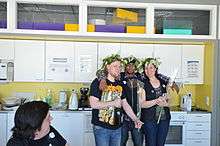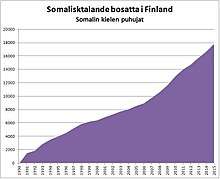Somali community in Finland
| Total population | |
|---|---|
| 20,007 (2017)[1] | |
| Regions with significant populations | |
| Helsinki | |
| Languages | |
| Somali · Arabic · Finnish · Swedish[2] | |
| Religion | |
| Islam |
Somalis in Finland are residents and citizens of Finland of Somali ancestry.
Overview

The first Somali immigrants came to Finland in the late 1980s and early 1990s. Between 1990 and 1995, the number of Somalia citizens in Finland jumped from 44 to 4,044. The first arrivals were university students from Soviet universities in the former Soviet Union (see Zahra Abdulla). Later, more asylum seekers arrived directly from Somalia, many through a program of family unification.[3]
In 2010, it was estimated by the Finnish immigration service (Migri) that a majority of all Somali refugees arriving in Finland were illiterate due to the Somali Civil War having destroyed the opportunities for those born after the 70s to attend the school system.[4][5]
A 2012 Terveyden ja hyvinvoinnin laitos (THL) survey of Somalia-born immigrants in Finland found that, prior to their arrival, around 50% of males and 50% of females had attended primary school (Peruskoulu), 39% of males and 17% of females had attended high school (Lukio), and 11% of males and 33% of females had not attended school (Ei lainkaan).[6] According to Statistics Finland, in 2012, 77.9% of Somalia-born immigrants in Finland had attained a lower secondary or unknown education level, 17.9% had attained an upper secondary education level, and 4.2% had attained a tertiary education level.[7]

Like other immigrant groups in Finland, particularly Muslims, Somalis have been targets of hate crimes. According to a 2009 report by the Police College of Finland, 8% of total victims were Somali-born, while representing only 4% of suspected offenders.[8] Most suspected perpetrators are young Finnish men, with similarly-aged Somali, Iraqi and Turkish immigrants mainly targeted.[9] According to social workers, the pressure of living between two disparate cultures has also resulted in instances of petty crime amongst disaffected 17- to 20-year-olds in the Somali community. The situation is compounded by the unfamiliarity of Somali parents with the various social services that are available to address similar circumstances. To tackle the issue, Somali community organizations have teamed up with Finnish police and social services officials, with the municipal authorities in Helsinki endeavouring to recruit more Somali social workers.[10]
As with many other immigrant groups in Finland, Somalis have also faced some barriers to employment, due in part to the local economic recession.[11][12] However, the situation has steadily improved over the years, as more Somali immigrants have found employment in their own community, although much of this work is unmeasured. While some Somalis with language training have found jobs in their own field, others, like immigrants in general, have obtained short-term work positions.[12]
Demographics

Somalis are one of the larger ethnic minorities in Finland, and the largest group of people of non-European origin. They are the fourth-largest minority in the country, after Swedes, Russians and Estonians.[13] In 2009, there were 5,570 Somali citizens, but an equal number may have received Finnish citizenship. According to the Finnish National newspaper, Helsingin Sanomat, the number of Somali-speaking people in Finland in 2010 rose by nearly 10% in a year.[14] In 2014, there were 16,721 Somali speakers in Finland.[1]
See also
References
- 1 2 Statistics Finland - Statistical databases
- ↑ SOMALIS
- ↑ Foreigners in Finland -ex Virtual Finland 2008 archived at Wayback Machine
- ↑ "(sv) Nästan alla somaliska flyktingar är analfabeter". YLE.fi. 31 March 2010. Archived from the original on 5 July 2012. Retrieved 10 November 2017.
- ↑ VUOSIKERTOMUS 2010 (PDF). Finnish immigration service. 2010. p. 27.
”Att ansökningarna hopar sig beror på att somalierna intervjuas personligen då det inte är möjligt att från deras hemland få handlingar som bevisar familjebandet. Största delen av de sökande är analfabeter och det är därför omöjligt att lägga fram skriftliga handlingar”, konstaterar Heikki Taskinen, direktör för immigrationsenheten.
- ↑ "Maahanmuuttajien terveys ja hyvinvointi" (PDF). Terveyden ja hyvinvoinnin laitos. p. 56. Retrieved 15 November 2017. ; also cf. Sandvik 2016, p.29: En dryg tredjedel av de somaliska kvinnorna hade aldrig gått i skola och ca en tiondel av dem svarade att de läser hjälpligt eller är analfabeter.
- ↑ "Ulkomaalaistaustainen väestö 2013 Befolkning med utländsk bakgrund Population with foreign background" (PDF). Statistics Finland. Retrieved 12 November 2017.
- ↑ Hate Crimes Reported in Finland, 2008 Archived 2012-04-01 at the Wayback Machine.
- ↑ The number of racist crimes drops – the impact of the phenomenon of hate speech is still a mystery
- ↑ Helsinki officials and Somali community groups ponder youth crime issue
- ↑ Huge differences in employment rates among immigrants from various countries
- 1 2 Somalis’ employment situation improving steadily
- ↑ "Migration in Europe: Looking for a home". The Economist. 29 Aug 2015. Retrieved 3 September 2015.
- ↑ Helsingin Sanomat
External links
- (in Finnish) Ulkomaalaiset Suomessa
